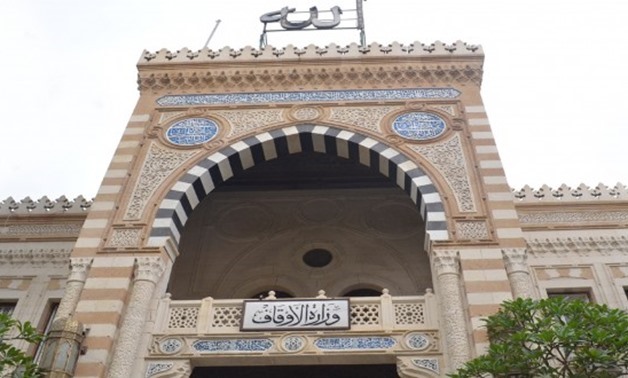
Egypt's Ministry of Religious Endowments Headquarters in Cairo- File Photo
CAIRO – 26 August 2018: Ministry of Endowments set a plan in cooperation with the Ministry of Health and Population to launch caravans, meetings and seminars raising awareness on population growth.
The Ministry of Endowments will hold a meeting next week to put the agenda and support it with its periodic publications.
In this regard, Minister of Endowments Mohamed Mokhtar requested Sheikh Mohamed al-Bastawisi, director of the ancient mosques department and coordinator of the raising awareness program, to set a plan for the caravans and a plan to educate the public through seminars and lectures.
Mokhtar also called for allocating a part of the Islamic weekly newspaper in Cairo called Minbar to humanitarian and population issues as well as family planning.
The Ministry of Endowments stressed that 100 imams will be requested to raise awareness on the dangerous population explosion in the targeted villages and hamlets as part of the plan’s first phase, and they will be trained on delivering lessons and seminars at mosques, health units and public places in this regard.
The number of Egyptians living inside the country hit 97.19 million early in 2018, according to the Central Agency for Public Mobilization and Statistics (CAPMAS).
“The population in Egypt is currently growing at a rate of 2.6 million individuals per year and the ministry is planning to raise awareness on family planning particularly contraceptive methods, with special focus on women in rural areas,” said Deputy Health Minister Tarek Mohamed Tawfik in a televised interview on January 15, 2018.
Cairo came as the most densely-populated governorate with 9.7 million people followed by Giza which accommodates 8.8 million people, the agency said in a statement on the occasion of the 29th anniversary of the World Day of Population.
Egyptians aged less than 15 years old constitute 34.2 percent of the total population while elderly people represent 3.9 percent, CAPMAS said.
Urban residents constitute 42.6 percent of the total production while rural ones represent 57.4 percent.
Birth rates declined from 2.9 percent in 2016 to 2.7 percent in 2017 and the natural growth rate of population went down from 2.5 percent in 2014 to 2.1 percent in 2017.
The problem of population growth is accompanied by the struggle Egypt's state institutions face to deliver the most basic public services, including the quality of education, healthcare and housing.
Moreover, according to CAPMAS, Egypt loses nearly 60,000 acres per year as a result of soil erosion and construction to meet population needs ofhousing. Moreover, the country’s share of water from the Nile, approximately 55 billion cubic meters per year, has remained unchanged since 1954 despite the increase in population. If the population rate increase continues, the state will not be able to support that many people, and national production would be insufficient to meet their needs, thus making the country dependent on imports, which further burdens the economy.
Moreover, overpopulation impacts the illiteracy rate which stands at 18 percent and the number of school drop-outs which reached 5.7 million in the age group 10-34 years old, according to the 2017 census. The census also reports that the percentage of citizens not enrolling in schools at all reached 30 percent of the total population.
Among Egypt’s comprehensive efforts to combat this phenomenon is a family planning campaign titled “Two are enough”.
The campaign aims to reduce the birth rate to 2.4, targeting rural areas where many view large families as a source of economic strength and resist birth control, believing that it is un-Islamic.
The Ministry of Social Solidarity pointed out that the project will be implemented through 100 NGOs selected by a technical committee that includes experts in various fields. These organizations were selected from 250 NGOs that submitted to participate in the implementation of the project. They were evaluated to assure their technical, financial and administrative performance.
Additionally, the Ministry of Health and Population, headed by Minister Ahmed Emadel-Din Rady, launched a new program on May 10 for family planning in Egypt, in cooperation with USAID, to respond to Egypt’s rapid population growth.
The program aims to improve citizens’ health behavior and support the quality of family planning services and reproductive health, according to Soaad Abdel Megid, head of the Population and Family Planning Sector.
She added that an electronic program will be established to register the beneficiaries of the program, implement a distance learning model, design a family planning and reproductive health curriculum in the medical and nursing schools, and involve the private and public sectors in providing the service.
USAID will provide technical assistance and training to the Ministry of Health and Population to strengthen its Family Planning and Reproductive Health Program. Activities will help increase demand for family planning services and enhance the quality of services, aiming to improve contraceptive use and reduce fertility over time. The 5-year, $19 million program will be implemented in nine governorates in Upper Egypt and areas of Cairo and Alexandria, the U.S. Embassy in Cairo stated on Saturday.
Additional report by Jehad El-Sayed

Comments
Leave a Comment